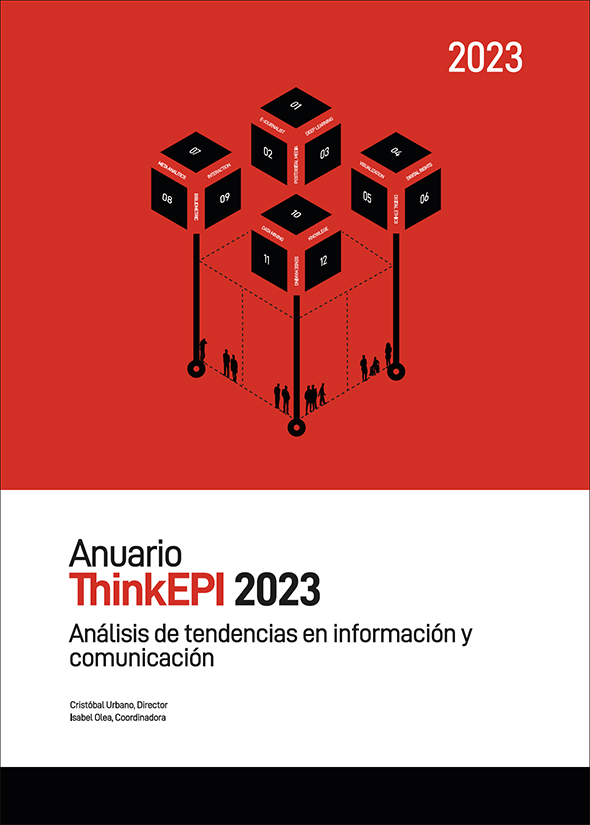Between what users say and what they do: the most useful UX research methods in assessing website quality
DOI:
https://doi.org/10.3145/thinkepi.2023.e17a14Keywords:
Website quality, User experience, Web analytics, Usability testing, Observation, Wuestionaire, WebsitesAbstract
Analysing user experience (UX) is a key factor in evaluating website quality. There are 20 methods for this purpose that, through qualitative or quantitative perspectives, examine people´s attitudes, behaviours or context of use. However, for different economic or practical reasons, this type of study is usually less utilized than heuristic evaluations. Therefore, this article details and recommends the most effective techniques in a prioritized manner. Web analytics -the tool that collects the largest amount of data- is in first place, followed by usability tests, observation and questionnaires. All of these have the aim of facilitating the listening to of users´ voices and finding out what it is they really do when on a website.
Downloads
References
Bevan, Nigel; Carter, James; Harker, Susan (2015). "ISO 9241-11 revised: What have we learnt about usability since 1998?". Human-computer interaction: Design and evaluation, pp. 143-151. https://doi.org/10.1007/978-3-319-20901-2_13
Díaz-Noci, Javier (2020). "Guía de métodos de investigación aplicados al entorno digital". Methodos: Anuario de métodos de investigación en comunicación social, n. 1, pp. 4-19. https://doi.org/10.31009/methodos.2020.i01.02
González-Teruel, Aurora; Barrios-Cerrejón, Maite (2012). Métodos y técnicas para la investigación del comportamiento informacional: fundamentos y nuevos desarrollos. Gijón: Trea. ISBN: 978 8497046718
Kaushik, Avinash (2010). Web analytics 2.0: The art of online accountability & science of customer centricity. Wiley Publishing, Inc. ISBN: 978 0 470 52939 3
Martín-Moreno, Carmen (2007). "Metodología de investigación en estudios de usuarios". Revista General de Información y Documentación, v. 17, n. 2, pp. 129-149. https://revistas.ucm.es/index.php/RGID/article/view/RGID0707220129A
Morales-Vargas, Alejandro; Pedraza-Jimenez, Rafael; Codina, Lluís (2023). "Website quality evaluation: a model for developing comprehensive assessment instruments based on key quality factors». Journal of documentation, v. 79, n. 7, pp. 95-114. https://doi.org/10.1108/JD-11-2022-0246
Paz, Freddy; Paz, Freddy A.; Villanueva, Daniela; Pow-Sang, José-Antonio (2015). "Heuristic evaluation as a complement to usability testing: A case study in web domain". In: 2015 12th International Conference on Information Technology - New Generations, pp. 546-551. https://doi.org/10.1109/ITNG.2015.92
Pérez-Montoro, Mario (2010). Arquitectura de la información en entornos web. Gijón: Ediciones Trea. ISBN: 978 8497045032 http://hdl.handle.net/2445/123351
Rohrer, Christian (2022). When to use which user-experience research methods. Nielsen Norman Group. https://www.nngroup.com/articles/which-ux-research-methods
Rubin, Jeffrey; Chisnell, Dana (2008). Handbook of usability testing: How to plan, design, and conduct effective tests. Indianapolis, Ind.: Wiley. ISBN: 978 0470185483
Sanabre, Carles; Pedraza-Jiménez, Rafael; Vinyals-Mirabent, Sara (2020). "Double-entry analysis system (DEAS) for comprehensive quality evaluation of websites: case study in the tourism sector". Profesional de la información, v. 29, n. 4. https://doi.org/10.3145/epi.2020.jul.32
Sauro, Jeff; Lewis, James R. (2016). Quantifying the user experience: practical statistics for user research. Waltham, MA: Elsevier / Morgan Kaufmann. ISBN: 978 0123849687
Shneiderman, Ben; Plaisant, Catherine; Cohen, Maxine; Jacobs, Steven; Elmqvist, Niklas (2016). Designing the user interface: Strategies for effective human-computer interaction. Essex: Pearson Higher Education. ISBN: 978 1292153919
Tonkin, Sebastian; Whitmore, Caleb; Cutroni, Justin (2010). Performance marketing with Google Analytics: Strategies and techniques for maximizing online ROI. ISBN: 978 0470578315
Vitela-Caraveo, Alex; Urbano, Cristóbal (2020). "Analítica web en revistas académicas de acceso abierto: justifiación, planificación y aplicaciones". BiD: textos universitaris de biblioteconomia i documentació, n. 45. https://doi.org/10.1344/BID2020.45.15
Downloads
Published
How to Cite
Dimensions


